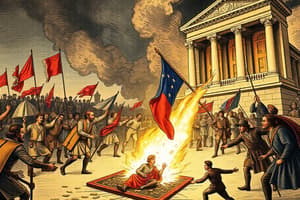Podcast
Questions and Answers
What was the primary support base of the Girondians?
What was the primary support base of the Girondians?
- Radical intellectuals and revolutionaries
- Urban working-class citizens
- Royalists and aristocrats
- Provincial and middle-class citizens (correct)
What role did the Committee of Public Safety play during the Terror?
What role did the Committee of Public Safety play during the Terror?
- They controlled the military, judiciary, and police (correct)
- They organized peaceful protests to end the Revolution
- They promoted diplomacy with foreign nations
- They led the Girondian faction's strategies
What was the Law of Suspect primarily used for?
What was the Law of Suspect primarily used for?
- To secure peace treaties with external threats
- To define and target suspected counter-revolutionaries (correct)
- To promote individual rights and liberties
- To establish trade regulations in France
Why were public executions carried out during the Terror?
Why were public executions carried out during the Terror?
What characterized the government known as The Directory?
What characterized the government known as The Directory?
What were the primary causes of the French Revolution?
What were the primary causes of the French Revolution?
What was the primary social disparity leading to the French Revolution?
What was the primary social disparity leading to the French Revolution?
What role did the Enlightenment play in the French Revolution?
What role did the Enlightenment play in the French Revolution?
Which of the following was NOT a factor contributing to France's economic troubles before the revolution?
Which of the following was NOT a factor contributing to France's economic troubles before the revolution?
What was King Louis XVI's perceived character that contributed to the political instability in France?
What was King Louis XVI's perceived character that contributed to the political instability in France?
Which event demonstrated to the French that an oppressive regime could be overthrown?
Which event demonstrated to the French that an oppressive regime could be overthrown?
What was a major consequence of the harsh weather conditions in 1788 for France?
What was a major consequence of the harsh weather conditions in 1788 for France?
How did Marie Antoinette's background influence public perception of her during the revolution?
How did Marie Antoinette's background influence public perception of her during the revolution?
What was the primary purpose of the Estates General when it was convened on May 1, 1789?
What was the primary purpose of the Estates General when it was convened on May 1, 1789?
Which group declared itself the National Assembly during the early stages of the French Revolution?
Which group declared itself the National Assembly during the early stages of the French Revolution?
What did the Tennis Court Oath signify in the context of the French Revolution?
What did the Tennis Court Oath signify in the context of the French Revolution?
The Storming of the Bastille is largely viewed as the symbolic start of which event?
The Storming of the Bastille is largely viewed as the symbolic start of which event?
Who was the principal author of the Declaration of the Rights of Man and Citizen?
Who was the principal author of the Declaration of the Rights of Man and Citizen?
What was the main reason for the Women’s March on Versailles in October 1789?
What was the main reason for the Women’s March on Versailles in October 1789?
What was the outcome of the Flight to Varennes in June 1791?
What was the outcome of the Flight to Varennes in June 1791?
What year marks the establishment of the French Republic?
What year marks the establishment of the French Republic?
Which measure was introduced to replace the old calendar system during the revolutionary period?
Which measure was introduced to replace the old calendar system during the revolutionary period?
What was a significant challenge faced by the newly established Republic?
What was a significant challenge faced by the newly established Republic?
Flashcards
Girondists
Girondists
A moderate political group during the French Revolution, gaining support from the provinces and the middle class.
Jacobins
Jacobins
A radical political group during the French Revolution, gaining support from urban areas and the working class.
The Terror (1793-1794)
The Terror (1793-1794)
A period of intense political repression during the French Revolution, led by the Committee of Public Safety, characterized by mass arrests, trials, and executions.
Committee of Public Safety
Committee of Public Safety
Signup and view all the flashcards
Law of Suspects
Law of Suspects
Signup and view all the flashcards
What was the French Revolution?
What was the French Revolution?
Signup and view all the flashcards
Who were the 1st and 2nd Estates?
Who were the 1st and 2nd Estates?
Signup and view all the flashcards
Who was the 3rd Estate?
Who was the 3rd Estate?
Signup and view all the flashcards
What was the Enlightenment's influence on the Revolution?
What was the Enlightenment's influence on the Revolution?
Signup and view all the flashcards
How did the American Revolution impact the French?
How did the American Revolution impact the French?
Signup and view all the flashcards
How did France's debt contribute to the Revolution?
How did France's debt contribute to the Revolution?
Signup and view all the flashcards
How did food prices impact the Revolution?
How did food prices impact the Revolution?
Signup and view all the flashcards
How did ineffective leadership contribute to the Revolution?
How did ineffective leadership contribute to the Revolution?
Signup and view all the flashcards
Estates General
Estates General
Signup and view all the flashcards
Cahier de Doleances
Cahier de Doleances
Signup and view all the flashcards
Declaration of the National Assembly
Declaration of the National Assembly
Signup and view all the flashcards
Tennis Court Oath
Tennis Court Oath
Signup and view all the flashcards
Storming of the Bastille
Storming of the Bastille
Signup and view all the flashcards
The Declaration of the Rights of Man and Citizen
The Declaration of the Rights of Man and Citizen
Signup and view all the flashcards
Women's March on Versailles
Women's March on Versailles
Signup and view all the flashcards
Emigres
Emigres
Signup and view all the flashcards
The Flight to Varennes
The Flight to Varennes
Signup and view all the flashcards
Trial of Louis XVI
Trial of Louis XVI
Signup and view all the flashcards
Study Notes
The French Revolution (1789-1799)
- Political and social uprising, overthrew monarchy
- Established republic, redefined society
Causes of the French Revolution
Social Inequality
- First and Second Estates largely exempt from taxes
- Dominated high-ranking government, military, and judicial positions
- Enjoyed luxury and social prestige
- Third Estate bore heavy tax burden
- Excluded from meaningful political influence
- Lived in poverty (peasants) or faced high living costs (urban workers)
Ideological – The Enlightenment
- Philosophes challenged social hierarchies, highlighted inequalities
- Promoted ideas of liberty, equality, and fraternity
- Fueled demand for new social order
Ideological – The American Revolution
- American success over England demonstrated the possibility of overthrowing oppressive regimes
- French soldiers fought in America, brought back Revolutionary ideas and values.
Economic Issues – Debt
- France engaged in major wars (1689-1815, including the Seven Years' War (1756-1763))
- Massive war debt
- Resentment of England
- French support of the American Revolution (1776-1791) exacerbated the debt.
Economic Issues – Food Prices
- Severe weather (drought, harsh winter 1788), poor harvests.
- Grain supply fell, bread became scarce and expensive
- Hunger and malnutrition spread.
Political - Ineffective Leadership
- King Louis XVI:
- Young (20) and perceived as immature/indecisive
- Lacked confidence to rule
- Marie Antoinette: Viewed as extravagant, detached, and out of touch
- Perceived as extravagant and detached/out of touch
Towards Revolution: Meeting of the Estates General
- Estates General: Legislative body of the ancient regime
- Summoned to address financial crisis (May 1, 1789)
- Comprised of deputies (representatives) from all three estates
Further Revolutionary Steps
- Cahier de Doléances: List of grievances
- Differing demands between estates
- Voting structure debate: 1 man, 1 vote challenge
- 3rd estate declared National Assembly
Declaration of the National Assembly
- 3rd estate declared itself the National Assembly
- Claimed to represent the "common people"
- Demanded economic/social reforms
- Joined by some clergy and nobility
Tennis Court Oath
- National Assembly locked out of meeting hall
- Assembly met in a nearby tennis court
- Swore an oath to continue meeting until a new constitution for France was created
Storming of the Bastille (July 14, 1789)
- State prison, center of Paris
- Symbol of oppressive order
- Stormed by revolutionaries
- Thought to hold weapons, ammunition.
Inspirations and Important Events
- Symbolic start of French Revolution
- Declaration of the Rights of Man and of the Citizen (August 26, 1789)
- Marquis de Lafayette, Thomas Jefferson consultation
- Women's March on Versailles (October 5-7, 1789) - Women protested price of bread; forced relocation of Royal family to Paris
- Flight to Varennes (June 20-21, 1791): Royal family attempted to escape France, captured, increased calls for abolishment of monarchy.
- Declaration of French Republic (September 21, 1792): Established the 1st Republic
- Trial and Execution of King Louis XVI - King tried for conspiracy, convicted, and executed (Jan 21, 1793).
Challenges to the Republic
- Coalitions of European Monarchies to crush the Revolution
- Counter-revolutionary uprising
- Intense rivalry and power struggles within the revolutionary government
Rival Political Groups
- Girondians: Moderate political group, provincial and middle-class support
- Jacobins: Radical political group, urban and working-class support
- Maximilien Robespierre: Lawyer/politician, leading figure of the Jacobins.
The Terror (Sept 1793 - July 1794)
- State terrorism; carried out by Committee for Public Safety
- Aimed to "preserve the Revolution"
- Committee of Public Safety (April 6, 1793): Controlled military, judiciary, police, executed counter-revolutionaries.
- Law of Suspects. Broadly defined "counter-revolutionary activity"
The Death of Robespierre (July 27, 1794)
- Robespierre's purge of enemies
- Arrest and execution of Robespierre.
- End of the Reign of Terror
The Directory (1795-1799)
- Centrist government, new Constitution (Constitution of Year III)
- Five directors chosen by 2 houses of parliament
- Directory proved weak and ineffective.
Revolutionary Calendar
- 12 months: 3 x 10-day weeks named to reflect seasons, days named mathematically.
Studying That Suits You
Use AI to generate personalized quizzes and flashcards to suit your learning preferences.




